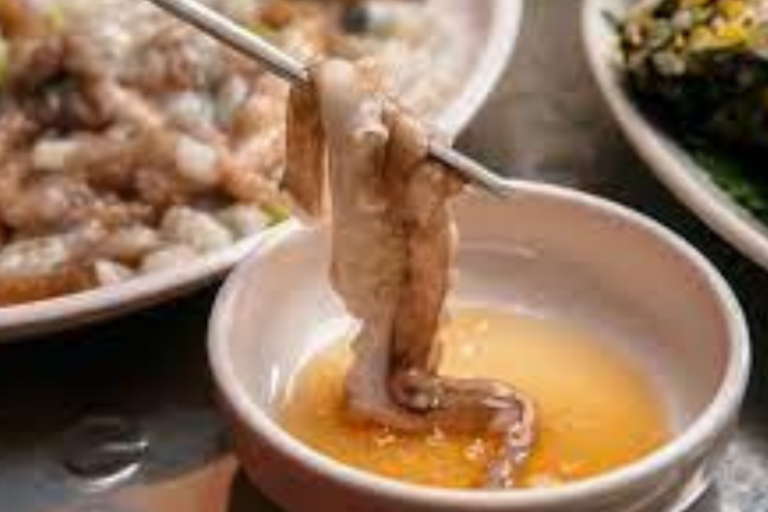Sannakji, a dish from Korea, is renowned for its preparation and unforgettable culinary experience. This dish involves slicing an octopus into pieces and serving them immediately while they continue to move on the plate. Though it may appear bold to some, sannakji holds a spot in culinary traditions, offering an exciting blend of freshness, texture, and taste. In this piece, we’ll walk you through a guide on how to prepare sannakji and share an anecdote that captures its cultural importance.
How to Create Sannakji
Ingredients
- 1 octopus (ideally a young one for tenderness)
- 2 to 3 tablespoons of sesame oil
- 1 to 2 teaspoons of toasted sesame seeds
- Soy sauce (optional for dipping)
- Chili paste (gochujang, optional, for dipping)
- 1 clove of garlic, finely minced (optional for dipping sauce)
- Finely chopped green onions (optional, for garnish)
Tools
- A sharp knife
- Cutting board
- A pair of chopsticks or tongs
- Serving plate
Steps Preparation:

Acquire a live octopus from a reputable source to guarantee its freshness.
Start by rinsing the octopus under running water to get rid of any dirt or debris. Be gentle, with it to ensure it stays alive until you’re ready to prepare it.
Cutting the Octopus
Place the octopus on a cutting board and hold it securely.
Use a knife to cut off the head of the octopus with care, as the head is typically not used in this recipe.
Cut the tentacles into bite-sized pieces quickly and accurately. After being cut, the tentacles may continue to move, which is a feature of sannakji.
Serving
Arrange the cut tentacles nicely on a serving plate.
Drizzle sesame oil over the octopus pieces and sprinkle toasted seeds on top for extra flavor and crunch.
If desired, add chopped onions for a touch of color and subtle flavor.
Make an optional dipping sauce by mixing soy sauce, a bit of gochujang (Korean chili paste) and finely minced garlic in a small bowl.
Enjoying the Dish
Serve the sannakji right away to enjoy its distinct texture and sensation.
Chew before swallowing since the suction cups, on the tentacles, can stick to your mouth or throat.
Remember always to chew your octopus to prevent any risk of choking.
Short Story
In the city of Seoul surrounded by lights and the alluring aroma of street food resided a chef named Min Jun. Renowned, throughout the city for his exceptional culinary talents and creative approach to traditional Korean cuisine his quaint restaurant tucked away in a narrow alley was always bustling with eager food enthusiasts.
One evening, Min Jun decided to feature Sannakji, a dish that elicits both admiration and apprehension. This specialty involves slicing octopus into pieces and serving it while still wriggling, an adventure not suited for the faint-hearted. Viewing this dish as a fusion of heritage and contemporary tastes, Min Jun aimed to provide a dining experience that stimulated all senses.
As the dinner crowd grew, Min Jun geared up for a visit from food critics excited to savor Korean flavors. With care, he cleaned the octopus, handling it with utmost precision. Using a blade, he expertly detached the head. Cut the tentacles into bite sized portions. The squirming tentacles were artfully arranged on a plate before being drizzled with oil and sprinkled with sesame seeds for an extra crunch and flavor boost. Adding a touch, he garnished the dish with chopped green onions.
As the critics settled in their seats, plates of Sannakji were served, a mesmerizing display of movement, on each plate. The atmosphere, in the room, was filled with a mix of anticipation and excitement. Min Jun stood at the forefront, sharing the story of Sannakji with a focus on honoring the ocean and the courage needed to appreciate it. The critics listened intently, captivated by his narrative.
As the evening progressed, hesitations transformed into joy. The critics were impressed by the journey, commending Min Jun for his talent and daring spirit.
What next:
- Crocodile Ice Cream: A Wild Adventure in Dessert-Making
- Pasta Carbonara- A Classic Italian Delight
- Japanese Miso Glazed Salmon – A Delicious Taste and Health
- Feijoada – A Taste of Brazil
- Bouillabaisse – The Legendary Fish Stew, from Marseille


